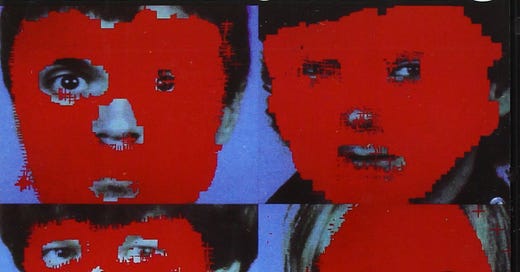You may find yourself speculating that the final track on Talking Heads’ Remain in Light is meant to be a Joy Division tribute.
You may find yourself wrestling with the idea that this tribute was an attempt to sound like the band based only on descriptions of their music.
You may find yourself surprised that it’s a decent effort from Talking Heads if that was the intention.
This, of course, has never been confirmed by anyone involved, but it does seem to be an attempt to capture the mood of the music created by Joy Division based on descriptions in the music press. All Music’s review of their second and final album, Closer, features album moods of; bleak, cold, eerie, gloomy, detached and ominous. I think ‘The Overload’ gets at least a partial tick for all those. David Byrne delivers a dispassionate and displaced vocal that isn’t too far away from the target of Ian Curtis’s vocals on both Unknown Pleasures on Closer.
Remain in Light itself is a build on the work the band and top boffin Brian Eno had developed on Fear of Music. This album pushed at boundaries by adding African poly-rhythms inspired by musicians like Fela Kuti and melding funk and electronics to their post-punk sensibilities. This isn’t evident in ‘The Overload’, which, in honouring the perceived sound of Joy Division, is a more industrial and Gothic piece, even if the backing by Byrne and Jerry Harrison has elements of tribal percussion.
Byrne was having issues with writer’s block, so the lyrics developed a more displaced lyrically style with the words channelled through him. That’s a technique that reaches fruition by the end of the album. What ‘The Overload’ does well is channel the eeriness throughout the record without the type of backing that disguises it elsewhere on the album under the groove. The song was too good to leave off the album, and despite sounding like a Fear of Music cut, the album’s arc bends towards it.
There’s a real sense of that type of instrumentation ratcheting down through the back half of the record as the energy levels and BPMs drop. By the time we are at ‘The Overload’, we have abandoned the dance floor and left with a dark underbelly on display.
The lyrics, for once on the album, match the backing and the performance. Without wishing to be corny, this is not a track that remains in the light. It is disinterested in the human condition and makes us feel small and unimportant in the universe - with moments of happiness fleeting and rare. The black hole at the album’s end leaves us feeling empty and numb. It is like watching a dying robot trying to walk through quicksand - flashes and pulses of energy are not enough to sustain it or us.
Next week: The Doors and Radiohead




